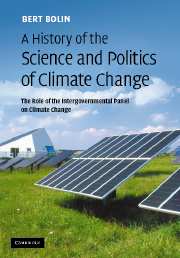 A History of the Science and Politics of Climate Change
A History of the Science and Politics of Climate Change Book contents
- Frontmatter
- Contents
- Foreword by Bo Kjellén
- Abbreviations
- Part I The early history of the climate change issue
- Part II The climate change issue becomes one of global concern
- Part III Are we at a turning point in addressing climate change?
- 12 Key scientific findings of prime political relevance
- 13 Climate change and a future sustainable global energy supply
- Some concluding remarks
- Notes
- References
- Name index
- Subject index
13 - Climate change and a future sustainable global energy supply
Published online by Cambridge University Press: 03 May 2010
- Frontmatter
- Contents
- Foreword by Bo Kjellén
- Abbreviations
- Part I The early history of the climate change issue
- Part II The climate change issue becomes one of global concern
- Part III Are we at a turning point in addressing climate change?
- 12 Key scientific findings of prime political relevance
- 13 Climate change and a future sustainable global energy supply
- Some concluding remarks
- Notes
- References
- Name index
- Subject index
Summary
Combating climate change implies resolving the controversial issue of how to renew the global energy supply system, and simultaneously reduce emissions of greenhouse gases to the atmosphere.
Delayed action in spite of trustworthy scientific assessments
Mitigating climate change is finding ways and means to reduce emissions to the atmosphere and to enhance sinks for the atmospheric components that disturb the radiative balance of the earth with space. But it is equally important that this should be done in a way that minimises costs and the degree of disturbance to countries and people, ensures a sustainable development and is in this sense politically acceptable. The issue is thus not primarily a technical and economical one, but societal and political, even though technical and economic analyses of the means to deal with it are very important as a basis for identifying and reaching agreements on action plans and how they are to be implemented. A brief overview of matters that are of prime concern in this context will be given in this concluding chapter, especially with regard to the basic scientific and technical knowledge about the global society that will be required. The best common understanding of this issue is a prerequisite in order to mitigate a human-induced climate change quickly enough. This is, however, not the place to analyse the technically complex issue of alternative future global energy systems in detail.
Stabilising the global climate must necessarily be a worldwide cooperative undertaking, but it is important to recognise countries' differing ability to contribute. This is well expressed in the Climate Convention.
Article 3
1 … the Parties should protect the climate system for the benefit of present and future generations of humankind, on the basis of equity and in accordance with their common but differentiated responsibilities and respective capabilities.[…]
- Type
- Chapter
- Information
- A History of the Science and Politics of Climate ChangeThe Role of the Intergovernmental Panel on Climate Change, pp. 214 - 247Publisher: Cambridge University PressPrint publication year: 2007
